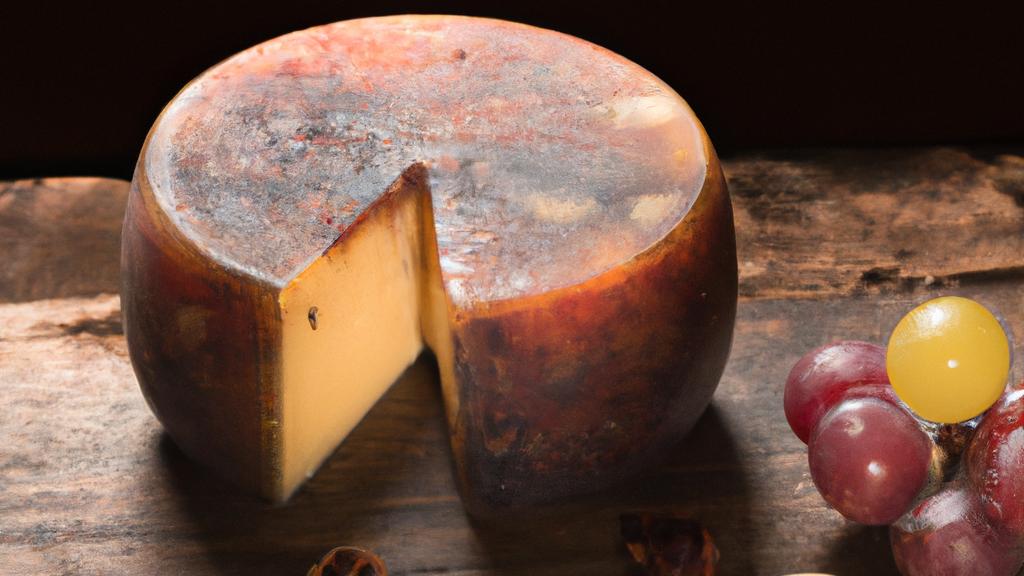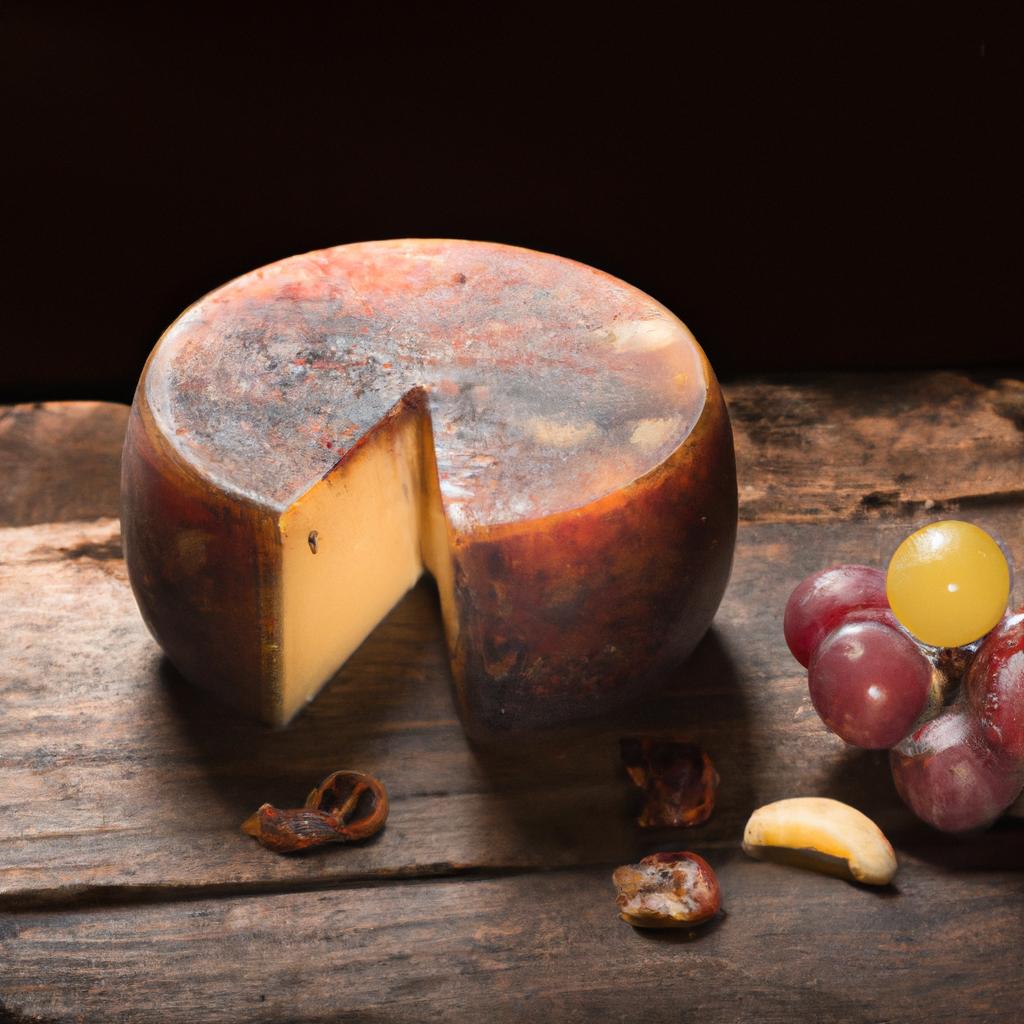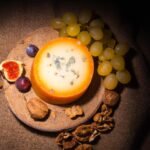
From the heartland of Brazil, specifically the Serro region of Minas Gerais, comes a carefully crafted and nationally loved cheese, Queijo do Serro. Noted as one of the oldest and most traditional artisanal cheeses of the region, Queijo do Serro has a rich history dating back to the 18th century. This cheese is not only famed for its historical roots and the meticulous artisanal methods used in its creation, but also for its distinctive sensory characteristics.
On the surface, Queijo do Serro does not appear extravagantly different from other cheeses; however, the true essence lies in its rustic, semi-hard texture and subtly aromatic flavors. The cheese’s velvety texture is halfway between creamy and crumbly, melt-in-your-mouth without losing its form. When tasted, it reveals a gentle balance of flavor that encompasses the sweetness of cooked milk, subtle hints of fresh butter, and a mellow tang, a result of its 17 to 22 days ripening period.
Another fine point that sets Queijo do Serro apart from the rest is the purity of its ingredients and the artisanal path to its creation. The production process complies with specific conditions, which guarantee the cheese’s authenticity and quality:
- Milk Source: Produced solely from unpasteurized cow’s milk sourced from small-scale local farms, it champions the use of a zebu breed called “Gir,” renowned for its superior milk production.
- Location and Climate: The cheese is created exclusively in the Serro region, situated in the rugged, hilly terrains of southeast Brazil. The region’s unique microclimate significantly influences the distinct flavor and texture of the cheese.
- Artisanal Production: Unlike mass-produced cheeses, Queijo do Serro relies heavily on traditional processes, shunning mechanical intervention. The cheesemaking process employs freshly sourced raw milk, warmed on a wood stove, naturally curdled, molded by hand in traditional wooden molds, and natural cave ripening. This artisanal production contributes to the natural, wholesome taste of the cheese.
Perhaps the most significant aspect of Queijo do Serro is the integral role it plays in local culture and economy. Its production is not just a process but an inherited tradition, passed down generations, and an important livelihood for many local families. As such, it was recognized by the Slow Food Foundation for Biodiversity, which seeks to preserve high-quality food produced in a clean, fair, and traditional way.
Welcome to our short quiz on the topic of ‘Queijo do Serro cheese from Brazil’! Gauge how well you’re acquainted with this traditional Brazilian cheese, its production, and unique characteristics. Ready to delve into the world of Brazilian gastronomy and sharpen your cheese connoisseur skills? Let’s get started!

Unveiling the Charm of Queijo do Serro, Brazil’s Hard Cheese Coveted Worldwide
If you’re a cheese aficionado, you’ve perhaps savored Gouda, Camembert, and Parmesan. However, if you have not yet tasted Queijo do Serro, you are missing out on a cheese experience unlike any other. Queijo do Serro originates from the Serro region in Brazil and is one of the country’s most prized traditional hard cheeses. Made since the 18th century, this cattle milk cheese is a living testament to Brazil’s rich grazing pastures and vitally, an inherited knowledge on unique artisanal cheese making techniques. Its distinctive texture and flavor profile make Queijo do Serro highly sought after by both local Brazilians and international cheese connoisseurs.
Queijo do Serro is a raw milk cheese produced from a specific blend of cattle breeds: 70% Gir cattle milk and 30% zebu breeds like the Guzerat, Nelore, and Zebu. The production process begins with milk being gently heated to 37°C and mixed with a coagulation agent called “pingo”, a native lactic ferment. After the curd sets, it is cut into small pieces, slowly drained, and salted before being pressed into wooden bennet molds famously crafted from local Araucaria wood. The cheese rounds are then aged for a minimum of 17 days up to several months, depending on the desired level of maturity. This dedicated, controlled process marks the cheese’s incredible vivid flavor and allure.
The flavor profile of Queijo do Serro is intensely glorious. As a semi-hard cheese, it possesses an exquisite blend of creaminess and firmness, melting smoothly in your mouth while also providing a satisfying bite. Its taste is mild but complex, harmonizing notes of fresh butter and sweet cream with earthy nuances and the slightest tang in the finish. Coupled with a myriad scent, it’s a sensory delight for every cheese-lover. The cheese’s creamy hue can range from white to pale yellow, while its rind develops a darker, golden brown layer during the maturation process. Distinct Characteristics of Queijo do Serro:
- Maturity: From semi-hard to hard
- Color: Creamy white to pale yellow cheese, with a golden brown rind
- Texture: Firm, slightly elastic, and smooth
- Flavor: Fresh butter and sweet cream notes, with earthy nuances
- Scent: Fresh milk and slightly pungent
Queijo do Serro’s diversity allows it to cater to a variety of gastronomical preferences. It is a delightful accompaniment to fresh fruits such as grapes and peaches, pairs well with a glass of red wine or artisanal beers, and lends itself superbly to traditional Brazilian recipes. So, whether you’re a traditionalist or a culinary explorer, Queijo do Serro is a cheese that invites you to delve into the rich cheese culture of Brazil.
Queijo do Serro: A Taste of Tradition from the Heart of Brazil
Queijo do Serro is a traditional and renowned cheese from the region of Serro in the southeastern state of Minas Gerais, Brazil. This exceptional cheese has a rich history and a unique flavor profile that sets it apart from other cheeses.
Produced in a mountainous region with a cool climate, Queijo do Serro benefits from the fertile soil, lush pastures, and traditional production techniques that have been passed down through generations. The cheese-making process is deeply ingrained in the local culture, and strict regulations ensure its authenticity and quality.

The production of Queijo do Serro begins with the milk of local cows, which graze freely on the natural vegetation of the region. The milk is then heated in copper cauldrons, and natural rennet is added to curdle it. The curds are carefully cut and pressed, resulting in a unique texture and flavor.
Queijo do Serro is typically aged for a minimum of 15 days, but it can be aged for up to two years. During the aging process, the cheese develops complex flavors and acquires a slightly crumbly texture. It is often described as having a nutty and tangy taste with a hint of sweetness.
- Queijo do Serro is made exclusively from raw cow’s milk.
- It has a distinctive yellowish color and a rough, irregular shape.
- The cheese has a natural rind that protects it during the aging process.
- Queijo do Serro is considered a protected geographical indication (PGI) product in Brazil, ensuring its authenticity and origin.
- It is commonly enjoyed as a table cheese, grated over dishes, or paired with fruits, jams, and wines.
Queijo do Serro represents not only a delicious cheese, but also a cultural heritage deeply rooted in the region of Serro. Its unique flavors and traditional production methods make it a true gem for cheese enthusiasts and an excellent choice for those seeking distinctive and authentic culinary experiences.
- To start with, Queijo do Serro is derived from raw cow’s milk that is predominantly of Dutch, Guzerá, and Caracu breeds.
- In fact, around 128,000 liters of milk are processed daily in the Serro region, turning into delicious cheese.
- Significantly, the tradition of making Queijo do Serro has been passed down from generation to generation, reinforcing its cultural value.
- Interestingly, Queijo do Serro is a household name in Brazil, and it is highly coveted in international cheese markets as well.
- Impressively, the cheese has gained global recognition and has been awarded the Slow Food Presidium.
- Moreover, the well-defined and stringent production process assures that each Queijo do Serro cheese retains its unique flavor and texture.
- Lastly, despite modern methods available, most of the farmers in Serro still prefer to make cheese using traditional methods.
Exquisite Culinary Creations with Queijo do Serro
Queijo do Serro, one of the crown jewels of Brazilian artisanal cheese production, hails from the historical Serro region in the state of Minas Gerais. Protected under Brazilian law and recognized by Slow Food, this semi-hard, unpasteurized cow’s milk cheese provides a peculiarly tangy and slightly milky flavor, prominently featuring a rich, buttery texture imbibed in its pale yellowish, natural rind. Queijo do Serro lends itself superbly well in gourmet culinary explorations. Below, we explore two exquisite recipes that aptly showcase its nuanced flavors: a traditional ‘Pão de Queijo’ and a delicate ‘Queijo do Serro and Fig Salad.’
Traditional Pão de Queijo with Queijo do Serro
- Ingredients: 500g of tapioca flour, 200g of Queijo do Serro (grated), 2 eggs, 100ml of vegetable oil, and boiling water as needed.
- Instructions: Preheat the oven to 180°C (356°F). In a bowl, pour boiling water over the tapioca flour, mixing until a dough forms. Add the eggs, oil, and Queijo do Serro, kneading until the mixture is homogeneously combined. Shape the dough into small, round balls (approx. 3cm in diameter) and place them on a baking tray. Bake until golden (around 20 minutes). Serve warm.
These enticing cheese breads are a staple in Brazilian cuisine, with the Queijo do Serro lending a unique, luscious flavor profile that subtly interplays with the slight sweetness of the tapioca flour, culminating in a sensational culinary experience.
Queijo do Serro and Fig Salad
- Ingredients: 100g of fresh Queijo do Serro, a handful of fresh rocket leaves, 2 tablespoons of honey, 4 fresh figs, and black pepper to taste.
- Instructions: Slice the Queijo do Serro and figs. On a platter, lay the rocket leaves evenly, then arrange the cheese and figs over the top. Drizzle honey evenly over the salad and finish with a sprinkling of black pepper to taste. Serve immediately.
This light, yet delightfully complex salad pairs the creamy, robust Queijo do Serro with the sweet, aloof notes of figs — a divine combination where the cheese’s subtle acidity beautifully offsets the sweetness of the honey-drizzled figs, creating a gastronomic masterpiece that both intrigues and pleases the palate.
Perfect Pairs: Discovering the Wonder of Queijo do Serro with Wine and Food
An artisanal cheese from Brazil, Queijo do Serro offers a unique gastronomic experience with its semi-hard texture, yellowish-white color and slightly salty, complex taste. Originating from the Serro region in Minas Gerais, its production follows traditional methods that have been passed down for centuries, ensuring a truly authentic flavor profile. As a connoisseur, you might wonder how to elevate your Queijo do Serro tasting experience. The answer lies in the careful selection of the right wine and dishes to pair.
As Queijo do Serro bears a rich, buttery flavor with a mildly pungent aftertaste, the choice of wine should possess the vigor to stand up to this robust cheese. The full-bodied, fruity notes of an Argentine Malbec or the balanced tannins of a French Cabernet Sauvignon pair remarkably well with Queijo do Serro. Additionally, a crisp, refreshing white wine like a Vinho Verde from Portugal helps cleanse the palate and highlight the numerous flavor nuances of the cheese. Then, there are the sparkling wines: an Italian Prosecco or a Spanish Cava, their effervescence effectively cuts through the cheese’s creamy texture, creating an intriguing juxtaposition of sensations in your mouth.
When considering what foods to pair with Queijo do Serro, balance is key. As the cheese has a subtly sharp taste, it complements hearty, rich dishes wonderfully. Some beguiling combinations include:
- Queijo do Serro with prosciutto, laying the cheese on a thin slice of this cured ham creates a perfect blend of saltiness and creaminess.
- Serving it alongside traditional Brazilian dishes, like feijoada or pao de queijo, can bring out the domestic characteristics of the cheese.
- Grilling Queijo do Serro and topping it on rustic bread, followed by a drizzle of honey or a sprinkle of chili flakes for a tantalizing mix of flavors.
A small serving of Queijo do Serro can also be used as the crowning glory of a gourmet pizza, adding an unmistakable Brazilian flair. Ultimately, your pairing choices with Queijo do Serro should enhance its characteristic flavor, transforming your cheese experience into an epicurean odyssey.
Similar Cheeses for Queijo do Serro
Queijo do Serro is a traditional cheese from the Serro region in Minas Gerais, Brazil. Made from raw cow’s milk, this cheese has a rich history dating back to the 18th century. Queijo do Serro is known for its unique flavor profile, which is characterized by its tangy and slightly spicy taste.
While Queijo do Serro is a standout cheese in its own right, there are a few other varieties of cheese that share similar characteristics and can be enjoyed by those who appreciate the flavors of this beloved Brazilian cheese. Here are a few examples of similar cheeses:
- Queijo Minas Artesanal: Another cheese from Minas Gerais, Queijo Minas Artesanal is made from raw cow’s milk using traditional methods. It has a creamy and slightly acidic taste, similar to Queijo do Serro.
- Queijo Coalho: Hailing from Northeastern Brazil, Queijo Coalho is a firm cheese made from cow’s milk. It has a slightly salty and nutty flavor, which can be likened to the tanginess of Queijo do Serro.
- Queijo Serra da Estrela: This Portuguese cheese is made from raw sheep’s milk and is known for its creamy and slightly spicy taste. It shares some similarities with Queijo do Serro, particularly in terms of its flavor profile.
- Queijo Cabacinha: This artisanal cheese from Brazil is made from raw cow’s milk. It has a smooth and rich texture, with a mild tanginess that is reminiscent of Queijo do Serro.
These cheeses are not exact replicas of Queijo do Serro, but they offer similar taste experiences that cheese aficionados may find enjoyable. Whether you’re looking to expand your cheese palate or simply complement your love for Queijo do Serro, these cheeses are worth exploring.


